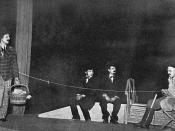"But the main thing for me, having read and seen the play many times since its appearance about fifty years ago, is that it is about waiting, about unending expectation, about the moment that comes before something which itself never comes, but which in the process reduces everyone to a frozen state of clown-like, pathetic, banality in which only limited motion is possible in virtually the same places." - (Edward Said: 'Waiting for the Change')
Indeed, Beckett's Waiting for Godot presents the nightmare of waiting without time. The subject of the play is not 'Godot' but waiting, the act of waiting as an essential and characteristic aspect of the human condition. Throughout our life we always wait for something and 'Godot' simply represents the object of our waiting - an event, a thing, a person, death.
Waiting for Godot is a play, which seems to refuse any attempt to impose meaning systematically, and it is a vision of irrational and unrationalisable process - sheer waiting without end or outcome, pure decay without the possibility of dearth.
The situation or condition that the play exhibits is a universal one. It is a story of two vagabonds who desperately plunge into a futile pattern: waiting. The 'Godot' they wait for is a vague figure and would probably be a disappointment to them if he came, but as long as they can make themselves believe that he will someday come and that he offers some kind of hope, they can comfort themselves with the thought that - " in this immense confusion one thing alone is clear. We are waiting for Godot to come."
Waiting is what really matters in Waiting for Godot. Beckett's emphasis is not 'Godot' but waiting. And in this play, the pattern of waiting is an ingenious combination of...


